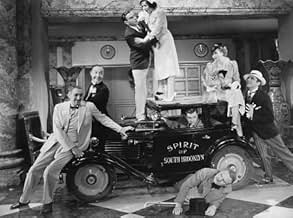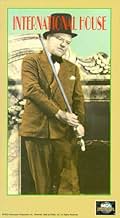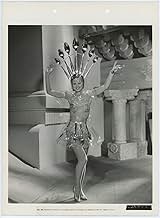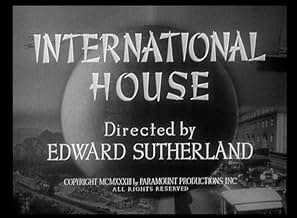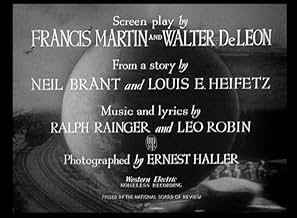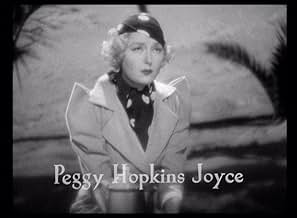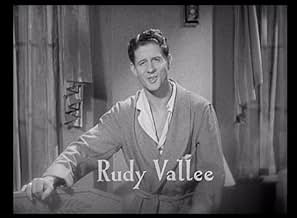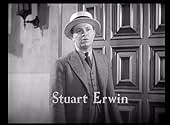PUNTUACIÓN EN IMDb
6,9/10
1,5 mil
TU PUNTUACIÓN
Añade un argumento en tu idiomaAssorted wacky characters converge on a Chinese hotel to bid on a new invention: television.Assorted wacky characters converge on a Chinese hotel to bid on a new invention: television.Assorted wacky characters converge on a Chinese hotel to bid on a new invention: television.
- Dirección
- Guión
- Reparto principal
Rose Marie
- Rose Marie
- (as Baby Rose Marie)
Reseñas destacadas
Why did Gracie Allen's sister learn French? Because she inadvertently took home a French baby, rather than her own, and wanted to be able to talk to him when he grew up. And why does cheerfully soused W.C. Fields have a roadster in his auto-gyro? For side-trips, of course -- like the one that takes him careening through the corridors, lounges and lobbies of the grandest hotel in Wu Hu China. It's right across the street from the flophouse where Bela Lugosi as gold digger Peggy Ann Joyce's insanely jealous ex-husband has been forced to reside. As for how Cab Calloway, singing a tribute to the heady pleasures of pot, and Rudy Vallee, serenading his megaphone, wander into the movie, they're among the images scanned up by a Chinese inventor who's attempting to televise a six-day bike race before television (as we know it today) was invented. Other pleasures in "International House" range from ten-year-old baby RoseMarie (who would eventually be the adult RoseMarie of the "Dick Van Dyke Show") doing a Sophie Tucker low blues and some surprisingly agile hoofing by Sterling Halloway. Fields' mumbling, bumbling, boozy millionaire staggers off with the comedy honors. But you don't even have to be Wiliam Claude Dukenfeld fan to find a lot to enjoy.
Although he's on the screen for only half the time this is classic early Fields. Before he became the put upon family man he was this obnoxious but nevertheless hilarious blustering boasting egomaniac. Perfect scene with him and Gracie Allan. Fields is at his nastiest best here- "what is the penalty for murder in China?" Gracie Allan is equally funny with George Burns impeccable as her comedy foil. I loved the line about not telling where she went to school.. There are other highlights as well.Skip the stupid romance and most of the Peggy Hopkins Joyce scenes but enjoy the pre-code sexiness, particularly in the Tea-Cup number and Fields comment after looking in a key hole at the hotel. A fast wild ride a'la 30's comedy and not to be missed by fans of the genre.
A lot of commotion falls upon the International House hotel in Wu Hu China. Doctor Wong is planning to demonstrate a new television device and sell it to Tommy Nash, representative of the American Electric Company. Nash escorts Peggy Hopkins Joyce to the hotel as well, which makes his fiancé jealous. Also jealous is Joyce's ex-husband, Gen. Nicholas Petronovich, who is also trying to buy the invention. Gen. Petronovich tries to have Nash quarantined, but only succeeds in quarantining the hotel, with him outside the hotel. The arrival of Prof. Quail, millionaire and drunkard, creates more chaos in the hotel with his crude manners, and enrages Gen. Petronovich when he mistakenly believes Quail is sleeping with Peggy. The International House turns into madness as everyone tries to return the hotel to normal. The movie is entirely plot less, but relies on its silliness to move along, and it works. Fields is a riot drunkenly stumbling around delivering his trademark one liners. Many of the other big stars make appearances via Wong's television (Rudy Vallee, Cab Calloway, Stoopnagle and Budd). Gracie Allen's hair-brained lines have a slight logic behind them to make them funny. The movie seemed to be a bit too chaotic at times, but the chaos works in certain scenes. Rating, 7
Certainly one of the funniest of the pre-code comedies. The premise of different bidders coming together to bid on the rights to the TV system is just an excuse to get alot of talent together, from W.C. Fields to Cab Calloway. The Burns & Allen segments are great here. That corny vaudeville shtick never worked better! Franklin Pangborn is in his element as the prissy, flustered hotel manager. God, he was hilarious! Too many great moments to try to list here. Thankfully this one is available in a great quality video and it's a shame that it isn't (yet) available on DVD (along with the other Fields Paramounts). Typical of the kinds of comedies that Hollywood (and Paramount in particular) excelled at during the Depression years. However, this one just has it all. Excellent absurd humor (Fields definitely paved the way for Monty Python and the like, believe it or not). This is not art or anything like that, don't expect a Chaplin or Keaton style film. No, this is just good, wacky fun, which is fine. If you liked INTERNATIONAL HOUSE be sure to check out the excellent Paramount comedy, MILLION DOLLAR LEGS (1932), also with W.C. Fields. This is a film with a similar vein of absurd comedy. At any rate, INTERNATIONAL HOUSE is a genuine classic comedy movie.
I've always wanted to use the word 'melange' in a review and here I finally have done it. That word is appropriate because this film is jam-packed with a wide variety of items--like a chef salad of films! There's a lot of comedy with W.C. Fields as well as Burns and Allen, romance with Stu Erwin and his sweetie, a jealous ex-husband (Bela Lugosi) and a lot of special appearances by radio stars (such as Baby Rose Marie--the same lady who later starred on "The Dick Van Dyke Show") and Cab Calloway--singing the ultra-bizarre "Reefer Man"--a film that makes fun of pot smoking! Yes, I did mean marijuana! This Pre-Code film has a lot of racy material other than the film--such as plenty of double-entendres by Fields, cohabitation and a song and dance number with surprisingly scantily clad ladies. Only a year later, after a tougher Production Code was enacted, much of this film simply wouldn't have been allowed--it just wasn't "proper family entertainment" according to the Hays Office (which is lampooned in a comment by Fields late in the film).
In many ways, the film is like a variety show and the plot really is rather irrelevant, though it is interesting to see such an early film talk about and supposedly demonstrate television. With so much variety in the film, many of the segments fall a bit short, but since they come and go so quickly, you're bound to be entertained only a moment later. Not great entertainment, but clearly an important film for lovers of classic cinema.
In many ways, the film is like a variety show and the plot really is rather irrelevant, though it is interesting to see such an early film talk about and supposedly demonstrate television. With so much variety in the film, many of the segments fall a bit short, but since they come and go so quickly, you're bound to be entertained only a moment later. Not great entertainment, but clearly an important film for lovers of classic cinema.
¿Sabías que...?
- CuriosidadesDuring the filming of one of W.C. Fields' scenes, a mild earthquake struck Los Angeles. The earthquake was supposedly captured on film. In the film clip, Fields and his co-stars are standing in the hotel lobby set, when the picture begins to shake as if the camera is vibrating. A chandelier on the set begins to swing back and forth, and a lamp suddenly falls over. Fields calmly ushers his co-stars off the soundstage, telling them to stay calm and walk slowly. The "earthquake footage" of Fields was played in newsreels across the country in the weeks following the 1933 quake. Nearly forty years later, however, director A. Edward Sutherland admitted that the "earthquake footage" was a hoax concocted by himself and Fields. It was done by rigging wires on the lamp and chandelier, and shaking the camera to simulate an earthquake. Sutherland claimed that he and Fields were amazed when the "earthquake footage" was accepted as genuine by newsreel distributors. "We shared a big laugh and an even bigger drink", Sutherland recalled. To this day, the fake "earthquake footage" is occasionally broadcast and accepted as genuine by entertainment television shows such as Access Hollywood (1996). The footage appeared in Hollywood Out-takes and Rare Footage (1983).
- PifiasDuring the scene where Prof. Henry R. Quail is by his auto gyro talking to Doctor Wong and Peggy Hopkins Joyce, you can see the shadow of the boom mic moving above their heads. The boom mic then hits something, presumably the auto gyro, making a noise which makes Prof. Henry R. Quail and Peggy Joyce look up.
- Citas
Professor Quail: Hey! Where am I?
Woman: Wu-Hu.
Professor Quail: Woo-Hoo to you sweetheart. Hey Charlie, where am I?
Hotel Manager: WU-HU!
[Professor Quail removes the flower from his lapel]
Professor Quail: Don't let the posey fool you!
- ConexionesFeatured in Oops, those Hollywood Bloopers! (1982)
- Banda sonoraShe Was a China Tea-cup and He Was Just a Mug
(1933) (uncredited)
Lyrics by Leo Robin
Music by Ralph Rainger
Sung offscreen by an unidentified man and danced by Sterling Holloway, Lona Andre,
Mary Jane Sloan, Gwen Zetter and Chorus
Selecciones populares
Inicia sesión para calificar y añadir a tu lista para recibir recomendaciones personalizadas
- How long is International House?Con tecnología de Alexa
Detalles
- Duración
- 1h 8min(68 min)
- Color
- Relación de aspecto
- 1.37 : 1
Contribuir a esta página
Sugerir un cambio o añadir el contenido que falta


